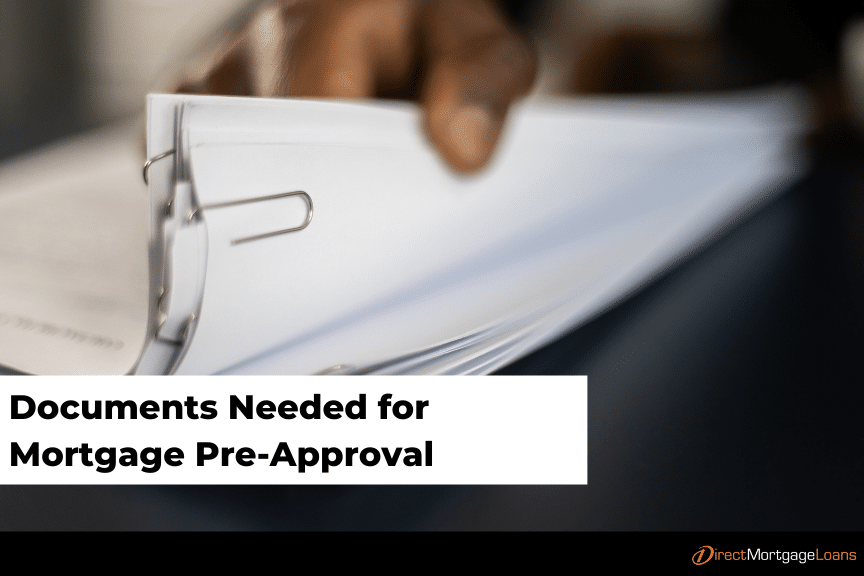5 Essential Documents for Mortgage Approval

Understanding the process of securing mortgage approval can be as daunting as a maze with no clear path. However, arming yourself with the right documents can transform the journey into a straight, manageable road towards homeownership. In this detailed guide, we will delve into the 5 essential documents for mortgage approval, discussing each document in depth, highlighting the necessity for preparation, and ensuring you are well-equipped for your lender's scrutiny.
Pre-Approval Stage: The Preliminary Application Form

The journey towards mortgage approval often begins with a Pre-Approval Letter. This document is crucial for several reasons:
- Initial Credit Assessment: Lenders evaluate your creditworthiness.
- Competitive Edge: Shows sellers that you are a serious buyer.
- Clarity on Budget: It provides a clear idea of the loan amount you can afford.
Here is a quick rundown of what the Pre-Approval Application Form should include:
| Document | Details |
|---|---|
| Personal Information | Full name, address, contact details. |
| Employment Information | Your current job, income, and employment history. |
| Financial Information | Details of your assets, liabilities, and current debts. |

Proof of Income: Pay Stubs or Employment Verification

One of the most critical aspects lenders examine is your ability to repay the loan, which necessitates providing proof of your income. Here are the documents you might need:
- Recent Pay Stubs: Typically, the last two to three pay stubs are required.
- W-2 Forms: For verifying your income over the past year or two.
- Employment Verification: A letter from your employer or HR department verifying your employment and salary.
- Tax Returns: Might be necessary for self-employed individuals or those with variable income.
📝 Note: If you are self-employed, you might need to provide additional documentation like profit and loss statements or business licenses.
Assets and Financial Stability

To demonstrate financial stability, lenders will want to see evidence of your assets. This could include:
- Bank Statements: Last 2 to 3 months, showing your savings, checking, and investment accounts.
- Retirement Accounts: Statements from IRA, 401(k), or pension funds.
- Investment Accounts: Brokerage accounts, mutual funds, or any other investments.
- Gift Letters: If your down payment is a gift from someone else, these letters confirm the source.
💡 Note: If you have large deposits in your bank account, be prepared to explain these, as lenders might suspect undisclosed income sources or risky financial behavior.
Credit and Debt Information

Lenders dive into your credit history and debt obligations through:
- Credit Reports: Pulled by lenders to evaluate your credit score and payment history.
- Debt-to-Income Ratio: Calculates your monthly debt payments against your gross monthly income.
- Credit Card and Loan Statements: To verify existing debts and payments.
Preparing for this examination involves:
- Checking your credit report for errors.
- Reducing outstanding balances on high-limit credit cards.
- Not closing old accounts as credit history also matters.
Proof of Identity and Property Documents

Finally, you need to establish your identity and ownership intentions:
- Identity Documents: A driver's license, passport, or other government-issued ID.
- Homeowners Insurance: Proof of coverage, as it protects both you and the lender.
- Property Information: If you've chosen a property, provide the sale agreement, property tax records, and any other relevant documents.
🚨 Note: Keep all documents organized in a clear and accessible manner. Lenders appreciate borrowers who come prepared.
In summary, securing mortgage approval requires a comprehensive set of documents, each playing a crucial role in your lender's decision-making process. From proving your income and assets to showing your financial stability and creditworthiness, these documents ensure that your path towards homeownership is well-lit. With this guide, you now know the documents to gather, how to prepare them, and what to expect during the application process. While the process can still seem complex, being fully equipped with the right paperwork makes it infinitely more manageable.
Why do lenders require so many documents for a mortgage?

+
Lenders require numerous documents to assess your financial stability, creditworthiness, and your ability to repay the loan. This is crucial for reducing the risk of default and ensuring the loan is a good investment for them.
What should I do if my income is variable?

+
Be prepared to provide additional documentation like tax returns for the past two years, P&L statements if you’re self-employed, or any contracts or agreements that show consistent work or income.
Can I still get a mortgage if I have bad credit?

+
Yes, but lenders might offer higher interest rates or require a larger down payment. Look into FHA loans or other government-backed mortgage programs that might be more lenient.
How long should I keep records of my financial documents for?

+
It’s advisable to keep financial records for at least 7 years, especially those related to mortgage applications and homeownership. This helps in case of any disputes or issues with your lender.
What if I don’t have all the required documents?

+
Contact your lender to understand if alternative documentation can be provided or if there’s a workaround for specific documents. Sometimes, electronic records or direct contact with your employer can suffice.